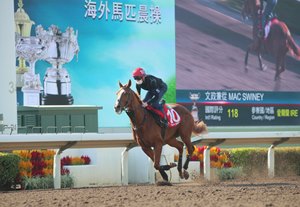Pandemic 'Bubble' Facilitates Foreigners to Hong Kong


Despite the lingering effects of the COVID-19 pandemic, the Hong Kong Jockey Club is set to celebrate its second December festival of group 1 racing Dec. 12 with global representation that would be the envy of a "normal" year.
Achieving that result has required plenty of patience, advance planning, accommodation, testing, vaccination, cooperation, and patience on the part of everyone involved. And some loose ends remain to be tied up with a few constituencies, including international media, still excluded from in-person attendance.
The key to attracting a strong representation of Japanese horses and seven Europeans for this year's four group 1s was the creation of a "bubble" that keeps the international visitors isolated from the Hong Kong-resident participants. The plan worked well for the 2020 Longines Hong Kong International Races and was replicated in April for Japanese horsemen competing on Champions Day.
The arrangement calls for all visitors to be vaccinated at least three weeks before arriving in Hong Kong and to provide two negative results of PCR-based nucleic acid tests within seven days and 48 hours, respectively, before their scheduled departure flights to Hong Kong.

Participants traveled to Hong Kong by designated private planes arranged by the Club. Movement in Hong Kong is limited to the airport, a quarantine hotel, and Sha Tin and Happy Valley racecourses.
At the tracks, the international competitors have separate jockey quarters and weigh-in, weigh-out facilities. Any stewards' inquiries or other official action is handled virtually.
All of the precautions are taken in close consultation with the government of the Special Administrative Region and in the context of China's ongoing tight border controls. As government approval is needed even for its normal, twice-weekly race meetings, the HKJC is accustomed to adhering closely to the dictates of the local health authorities.
The Club also has been at pains to point out to officialdom that the Hong Kong International Races have put Hong Kong in the forefront of international racing and thus are worth a significant effort.
"The successful staging of HKIR in December this year with the participation of high-profile overseas horses and racing participants will underscore Hong Kong's resilience and capabilities in addressing the COVID pandemic," the Club said in its successful pitch.
It doesn't hurt that the Hong Kong Jockey Club unquestionably is the premier expert in the field of equine biosecurity and the regulation of associated human movement. For more than two years, the HKJC has been moving horses and personnel through a biosecurity zone that extends from Hong Kong to the Conghua Racecourse about four hours' drive north, on the Chinese Mainland. The creation of that corridor required years of preparation and negotiation with provincial and national officials.
The Conghua operation has worked flawlessly and, despite some initial skepticism, has won international approval, including from Australian health officials.
Still, the Club knows government favor in face of a shifting public health landscape is never a given and that a "thank you" is as welcome as a "please."
"We would like to thank the government for the trust to have granted us the permission to hold the Hong Kong International Races," said HKJC CEO Winfried Engelbrecht-Bresges while announcing the arrangements.
Another key participant in the equation is the International Racing Bureau, the Newmarket, England-based facilitator of global participation in most of the world's big race meetings. The IRB interfaces with race organizers on one hand and owners and trainers on the other to smooth the bumps resulting from rules and regulations that vary from jurisdiction to jurisdiction.
"The HKJC have done a monumental job working with their government in order for international horses and connections to travel for the HKIR on Sunday," said Max Pimlot, who handles IRB activity with the Hong Kong Jockey Club.
"All (European) trainers, jockeys, and grooms flew out on a private charter and will remain in a bubble throughout their stay in Hong Kong. To have seven European horses competing on Sunday has been a remarkable effort from HKJC, IRB, and the horsemen competing."
